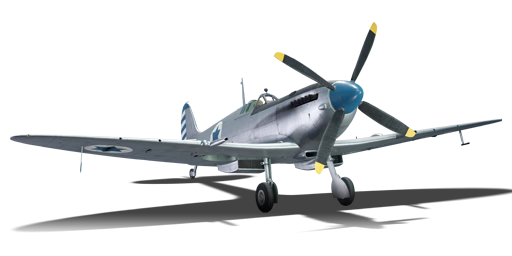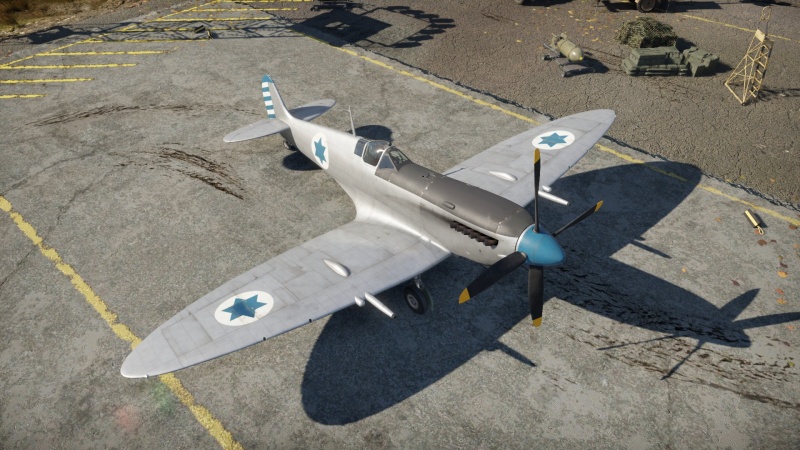Spitfire Mk IXc (Israel)
| This page is about the fighter Spitfire Mk IXc (Israel). For other versions, see Spitfire (Family). |
Contents
Description
Since the IAF lacked any kind of organised military after its independence, the Air Force intended to acquire any aircraft available on the market. While sanctions were placed on Israel for weapon sales, the IAF managed to acquire around 50 Spitfires from Czechoslovakia in 1948 at a cost of $23,000 per unit. The aircraft was deemed much superior to the S-199 Sakeen also acquired from Czechoslovakia and was very well-liked by Israeli pilots. It underwent some minor modifications, and variants with clipped wings were also sold to Israel or modified after being acquired. It was mainly used as an interceptor and air superiority fighter, while the P-51s were used in close air support and long range missions thanks to their increased fuel capacity and longer range.
Introduced along with the initial Israeli air tree in Update "Winged Lions", the Spitfire Mk IXc is an excellent dogfighter with its wing-mounted guns. It fits 2 x 20 mm Hispano cannons with 4 x 7.7 mm MGs that share similar muzzle velocity, making it easier to aim with tracer belts in the MGs and air or ground target belts in the Hispanos. The plane is more effective as a dogfighter, capable of outmanoeuvring most aircraft in air battles while also retaining enough ground armament to destroy almost any vehicle with the right aim and destroying light vehicles with ease.
General info
Flight performance
The Spitfire Mk IXc has excellent handling in air combat with outstanding manoeuvrability and agility at speeds above 350 km/h. However, it lacks the cruising speed and acceleration of others around its BR, losing speed easily in turns. It excels however in climb rate, reaching high altitudes with no problem compared to other similar BR fighters.
| Characteristics | Max Speed (km/h at 8,537 m) |
Max altitude (metres) |
Turn time (seconds) |
Rate of climb (metres/second) |
Take-off run (metres) | |||
|---|---|---|---|---|---|---|---|---|
| AB | RB | AB | RB | AB | RB | |||
| Stock | 627 | 609 | 11500 | 18.1 | 18.7 | 15.8 | 15.8 | 380 |
| Upgraded | 676 | 650 | 16.4 | 17.2 | 24.4 | 19.5 | ||
Details
| Features | ||||
|---|---|---|---|---|
| Combat flaps | Take-off flaps | Landing flaps | Air brakes | Arrestor gear |
| X | X | ✓ | X | X |
| Limits | ||||||
|---|---|---|---|---|---|---|
| Wings (km/h) | Gear (km/h) | Flaps (km/h) | Max Static G | |||
| Combat | Take-off | Landing | + | - | ||
| 774 | 270 | N/A | N/A | 230 | ~12 | ~7 |
| Optimal velocities (km/h) | |||
|---|---|---|---|
| Ailerons | Rudder | Elevators | Radiator |
| < 321 | < 400 | < 350 | > 450 |
Survivability and armour
- 38 mm Bulletproof glass - Armoured windscreen in front of the Pilot
- 3 mm Steel - Steel plate on top of fuel tanks
- 4 mm Steel - Steel plate on pilot's seat. Behind pilot is another 6-7 mm steel plate
- 3 mm Steel - Steel plates around ammunition and guns
- 1 mm - Steel plate over central fuel tanks
Note that one of the central fuel tanks (the one below the 1 mm steel plate) is not self-sealing, and thus a hit on this tank may result in severe fuel leaks
Modifications and economy
Pilots should prioritize "Radiator", "Compressor" and engine power upgrades to counter the poor cruising speed. However, the most important modifications are the Hispano upgrades, because these will overheat and thus jam with ease until the 1942 upgrade is installed. It is still recommended to push for the 1943 upgrade however.
Armaments
Offensive armament
The Spitfire Mk IXc (Israel) is armed with:
- 2 x 20 mm Hispano Mk.II cannons, wing-mounted (120 rpg = 240 total)
- 4 x 7.7 mm Browning machine guns, wing-mounted (350 rpg = 1,400 total)
Suspended armament
The Spitfire Mk IXc (Israel) can be outfitted with the following ordnance:
- Without load
- 2 x 250 lb AN-M57 bombs (500 lb total)
- 2 x 250 lb AN-M57 bombs + 16 x Flz.-Rakete Oerlikon rockets (500 lb total)
- 16 x Flz.-Rakete Oerlikon rockets
Usage in battles
The most common and dangerous opponents will be Bf 109s and P-51s due to their superior speed and acceleration especially at altitudes above 5 km when the Spitfire loses significant engine power. A better alternative is fighting at around 3-4 km, however, at this BR fighters like the Fw 190 and P-47s will outrun you but not outturn the Spitfire. However, your good climb rate means that getting to 4 km is faster compared to other planes like the ones mentioned earlier.
Pilots should use their superior agility to lure boom and zoom fighters to lower altitudes (around 3-4 km) and force them into a turnfight in which the Spitfire excels. Note that to initiate a turnfight pilots should be flying at 350-400 km/h, this is due to low energy retention, and thus prolonged fights with enemies should be avoided, especially if these enemies initiate the fight at high speed. The only planes that will consistently outturn you are all models of the A6M "Zero" and the A7M "Reppu".
Head-ons should be avoided due to the guns being wing-mounted and far from the centre of the plane, and they function better at close-mid range (up to 600 m) with 300-400 m of convergence. Hits at enemies flying straight are hard without good aiming, thus the best way to deal with foes is in a dogfight when the wing-mounted guns become a benefit.
The engine is known for overheating and this should be controlled by manually opening the radiator and reducing the throttle if necessary. The Spitfire requires knowledge and trigger discipline, but even with that, Hispanos have mediocre damage. Going for bombers without good aiming is not advised, however, when fighting them, attack from below to avoid the defensive turrets and go for the engines to set them on fire. Catching bombers will not be an issue with the excellent climb rate of the Spitfire.
Ground RB should be avoided, as the Hispanos lack the penetration to knock out light tanks or SPAAs and ground ordnance options are lacklustre. However, good aiming with the rockets may result in a good amount of destructions against light and medium targets. Pilots can also use the Spitfire to clear the skies when the enemy has complete air supremacy.
Manual Engine Control
| MEC elements | ||||||
|---|---|---|---|---|---|---|
| Mixer | Pitch | Radiator | Supercharger | Turbocharger | ||
| Oil | Water | Type | ||||
| Controllable | Controllable Not auto controlled |
Not controllable Not auto controlled |
Controllable Auto control available |
Combined | Controllable 2 gears |
Not controllable |
Pros and cons
Pros:
- Good roll rate and manoeuvrability at low speed
- Good low-altitude performance
- Larger ammo supply of 120 rpg for the 20 mm cannons
- Machine gun ammo pool of 350 rpg, good for inexperienced pilots
- Similar muzzle velocity between the MGs and the cannons making it easier to aim
- Amazing climb rate when upgraded
Cons:
- Poor cannon performance when stock (lack of accuracy and jamming)
- Poor damage output of the MGs
- Poor high altitude performance (above 5,000 m)
- Poor acceleration
- Roll rate compression ~400 km/h
- Prone to fires and not all fuel tanks are self-sealing
History
In 1948, Israel purchased ~50 Spitfires from Czechoslovakia, at a cost of $23,000 per unit. The first aircraft were introduced to Israel in what was known as "Operation Velvetta", specifically in Velvetta 1 and Velvetta 2, which consisted in these planes being flown from Czechoslovakia to Israel with stops to refuel.
These planes would be used most during the 1948 Israeli-Arab War, mainly by the 101 Squadron of the IAF. A few Spitfires were ready to participate in "Operation Yoav" in 1948 and were crucial in the early stages of the war. They filled a variety of roles, escorting B-17 and Beaufighter bombers, supporting ground forces, as well as flying air patrols and air reconnaissance.
Media
- Skins
- Videos
See also
- Related development
External links
Paste links to sources and external resources, such as:
- https://www.machal.org.il/1947-49/the-israel-air-force-spitfires-over-israel/ - The Israel Air Force – Spitfires Over Israel
- https://en.wikipedia.org/wiki/Operation_Velvetta - Operation Velvetta
| Supermarine | |
|---|---|
| Spitfires | |
| Merlin engine | Spitfire Mk Ia · Spitfire Mk IIa · Spitfire Mk.IIa Venture I · Spitfire Mk IIb |
| Spitfire Mk Vb · Spitfire Mk Vb/trop · Spitfire Mk Vc · Spitfire Mk Vc/trop | |
| Spitfire F Mk IX · Spitfire F Mk IXc · Spitfire F Mk XVI | |
| Spitfire LF Mk IX · Plagis' Spitfire LF Mk IXc | |
| Griffon engine | Spitfire F Mk XIVc · Spitfire F Mk XIVe · Prendergast's Spitfire FR Mk XIVe · Spitfire F Mk XVIIIe · Spitfire F Mk 22 · Spitfire F Mk 24 |
| Export | ▄Spitfire Mk Vb/trop · ▃Spitfire LF Mk IXc · ▂Spitfire Mk IXc · Spitfire Mk IXc · Spitfire Mk.IX (CW) · Spitfire LF Mk.IXe Weizman's |
| Seafires | Seafire LF Mk.III · Seafire F Mk XVII · Seafire FR 47 |
| Export | ▄Seafire LF Mk.III |
| Jet fighters | Attacker FB 1 · Attacker FB.2 · Scimitar F Mk.1 · Swift F.1 · Swift F.7 |
| Hydroplanes | Walrus Mk.I |
| Israel fighters | |
|---|---|
| Bf 109 | Sakeen |
| P-51 | P-51D-20-NA |
| Spitfires | Spitfire Mk IXc · Spitfire LF Mk.IXe Weizman's · Spitfire Mk.IX (CW) |





